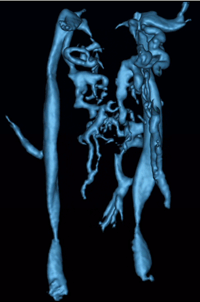

|
Collaborate with MS-MRI
Since the summer of 2010, we have processed more than 2,000 MS cases. We are constantly data mining these images and looking for important physiological data on MS and CCSVI. We invite you to send any relevant information such as research papers on MS research that you think may be of help related to the CCSVI theory. Please also read the history section on this web page.
As paraphrased by Dr. George B. Hassin of Chicago in 1935, when reviewing the more risky treatment of MS with sympathectomies: "...multiple sclerosis is such a distressing, hopeless condition that any therapeutic measure that appears promising should be given careful consideration, regardless of the difference of opinion as to the pathophysiologic features of this disease" [Wetherall]. Wetherell F. Cervicodorsal sympathectomy in multiple sclerosis. Arch Neurol Psych 1935; 34: 99-110. |

|
This section provides a list of sequences that can be used to collect data on arteries, veins, flow and iron content in the body for the CCSVI/SWI study. The radiologist will know how to run the following scans: THIS IS A FLEXIBLE PROTOCOL THAT CAN HAVE A VARIETY OF SEQUENCE TYPES USED AS LONG AS THE MAIN INFORMATION DESCRIBED ABOVE IS OBTAINED (MRV/FLOW/SWI) AS WELL AS A CONVENTIONAL MS SCAN IF POSSIBLE. For example, a spin echo T1 or MP-RAGE can be used or any other reasonable equivalent of any of the sequences shown here. We would recommend not using any resolution worse than what we have proposed although higher resolution would be fine. The closer we stick to creating similar information across systems the more useful this information will be in the future. General scanning procedure for any MR system and any field strength Scanning Procedure Siemens 1.5T: MRI Protocol for MS study for 1.5T Siemens Sonata SIEMENS MAGNETOM Sonata CP head coil SIEMENS MAGNETOM Sonata 8 channel coil The following files can be used to extract the protocol to your machine(phoenix self-extracting archive): 8CH COIL MS PROTOCOL - DICOM CP COIL MS PROTOCOL - DICOM 8CH COIL MS PROTOCOL - EDX CP COIL MS PROTOCOL - EDX Siemens 3T: Slides describing the imaging setup Preferred 3T Scanning Procedure (3 December 2010) Alternate 3T Scanning Procedure (3 December 2010) Imaging parameters Preferred MS Protocol (3 December 2010) Alternate MS Protocol (3 December 2010) Imaging parameters SIEMENS MAGNETOM Verio 12 channel head matrix Preferred Protocol (3 December 2010) SIEMENS MAGNETOM Verio 12 channel head matrix Alternate Protocol (3 December 2010) New Short Protocols for CCSVI Short 3T Protocol for Head Neck & Azygus MS study without Contrast (12 July 2011) Short 3T Protocol for Head Neck & Azygus MS study with Contrast ( 12 July 2011) Short 3T Protocol for Head & Neck MS study without Contrast (12 July 2011) Short 3T Protocol for Head & Neck MS study with Contrast (12 July 2011) The following files can be used to extract the protocol to your machine(phoenix self-extracting archive): Preferred MS Protocol (3 December 2010) - DICOM Alternate MS Protocol (3 December 2010) - DICOM Preferred MS Protocol (3 December 2010) - EDX Alternate MS Protocol (3 December 2010) - EDX |
